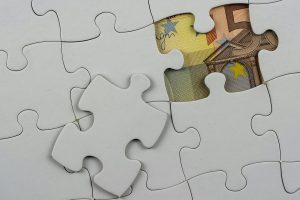One day in ninth grade, I looked in the mirror in the girls’ restroom and noticed how round my face looked. No one said anything offensive or made fun of me to make me think that. Earlier in the month, an injury took away my ability to play soccer—my main outlet for control and discipline—so it’s likely that the perfectionistic energy simply redirected itself.
Before games, I usually performed rituals like tying my shoelaces a certain way—and re-tying them if they felt “off.” During practices and matches, I strived for flawlessness to avoid failure and critical feedback.
From age 5 to 14, most of my focus revolved around soccer. Without that identity, I became preoccupied with my weight—a fixation that made sense, given the pressures of being a teenage girl in Southern California and the added challenge of a sprained ankle that made exercising difficult. In a short amount of time, I shed a significant number of pounds, making a return to soccer no longer an option. Honestly, I felt relieved. I had already become completely wrapped up in an obsession to reach the “perfect” weight.
At first, the goal was to look and feel healthier. But not long after I started restricting calories and doing exercises that wouldn’t aggravate my ankle injury, compliments from peers and family began to come in. The praise and attention only made the critical voice louder, scolding me for eating “too much” or skipping a workout. As my ankle healed, I started doing more cardio while cutting calories even further. When I felt I’d overeaten, the next day was marked by extra exercise and near starvation. Over time, my period stopped, but I didn’t care; I was too consumed with reaching a goal weight that kept shrinking beyond reach.
Every time I saw a picture of myself, it upset me, and the more I sought reassurance, the more upset I became. No one ever said the perfect words—most of the time, they said the exact opposite of what I needed to hear. In my free time, instead of hanging out with friends, I’d lift weights, do circuit training, and run excessively around the block or nearby track (sometimes both). Exercise isn’t harmful on its own, but without sufficient fuel, it left me drained and emotionally volatile. Life grew smaller and smaller, to a point where I even feared sitting down on a cushion in case it made my legs look fat.
In all honesty, I’m not exactly sure what finally pushed me to want to get better. Maybe with the onset of heart palpitations and panic attacks, the fear of dying from the illness began to outweigh the fear of gaining weight. There came a point where it was clear that this wasn’t the kind of life worth living. Now, I can confidently say that I no longer struggle with anorexia nervosa. When negative self-talk tries to pull me back in, I remind myself of three vital lessons anorexia taught me and the tools that helped foster healing:
1. Anorexia is Just One Theme of OCD/Perfectionism
When one obsession (e.g., checking behaviors) begins to lessen, the focus may shift to a different theme (e.g., fear of weight gain) that feels more emotionally charged, keeping the anxiety cycle alive. Obsessive-compulsive disorder (OCD) targets any area you deeply value or feel vulnerable in. For example, if you cherish openness, non-judgment, and unconditional love, you may start to worry about rejection, criticism, or conditional love because those fears directly undermine the very qualities that matter most to you.
Each theme revolves around identity, morality, or suffering, making it feel crucial to engage with. For someone with anorexia, perfection feels like a shield against rejection. Extreme control over food and weight creates a protective illusion, leading the sufferer to believe they are beyond reprimand and, therefore, feel accepted.
It’s essential to transform oneself from living in a limited, self-critical way to embracing greater authenticity and self-love—not just to recover from anorexia, but because if the root issue remains unresolved, it will continue affecting other areas of life even after recovery. In other words, the need for the perfect weight may evolve into a fear of aging and wrinkles or a focus on disgust and contamination. The root cause must be treated, not just the symptoms.
2. Focus on Self-Love
As a toddler, I didn’t equate worthiness with weight. Somewhere along the way, I picked up on self-limiting beliefs about value and deservingness. Those beliefs hardened into rigid rules, like: “Either I’m disciplined and in shape, or I’m lazy and disgusting.” Since black-and-white thinking and criticism helped fuel this phobia, healing will require flexibility and self-compassion.
Setting internal boundaries is a powerful act of self-love. One way to practice this is through Exposure and Response Prevention (ERP), a form of Cognitive Behavioral Therapy (CBT) that helps build inner boundaries by teaching you to face anxiety without turning to compulsions for relief. For example, instead of exercising to the extreme, stop a little earlier—even if it doesn’t “feel right.” Over time, the brain learns that the urge does not control you. Another boundary might involve gradually reducing how often you weigh yourself: from several times a week to once a week, then every other week, and eventually not at all—until the urge fades entirely.
Reframing extremes is a helpful way to challenge black-and-white thinking, also known as all-or-nothing thinking. For instance, a rigid thought might sound like: “I’ve gained weight — I’ve completely let myself go.” Follow that with the question: “What’s a more balanced way to look at this?” Then, reframe the original statement with something more compassionate and nuanced: “Yes, I’ve gained some weight, but that doesn’t mean I’ve let myself go. My body reflects the reality of what I’ve been going through—and that’s okay. I can treat myself with care and make choices that support my well-being, without shame or judgment.”
3. Reassurance Will Keep You Stuck
Seeking reassurance—turning to others for comfort or direction—often feels soothing, especially when you’re overwhelmed or scared. However, when used too often, reassurance can backfire. It may reinforce anxiety, discourage emotional independence, and prevent you from learning how to sit with discomfort. What begins as relief can turn into a cycle of dependence, where lasting peace is always sought outside rather than built within.
Self-validation, on the other hand, means recognizing and accepting your emotions without judgment. This may sound like: “My weight shifts like the seasons—changing and natural. It makes sense to feel frustrated sometimes, and that’s okay. These changes don’t define my worth or who I am.” In triggering moments, pausing to ask, ‘What do I truly need right now?’ helps you reconnect with your genuine thoughts and emotions, free from the influence of others’ opinions. Turning inward in this way cultivates a stronger sense of self, one that’s firmly rooted in your core values.
To strengthen this process, it helps to expand your sense of self beyond the obsession by building a broader, more diverse identity. Exploring new interests, engaging in meaningful activities such as volunteering, and spending time with different social circles can support your healing, helping you move beyond anorexia and embrace a fuller, more connected life. This way, when you seek advice from others, it aligns more genuinely with your true interests and who you are.
About the Author: Andrea is a mental health blog post writer. Her experiences with anxiety disorders have inspired her to help those suffering with similar conditions. She believes through action and faith nothing is impossible. If you’d like more tools for anorexia or advice for anxiety/OCD, she can be reached by email at andreaabbott23@yahoo.com
Photo by Vanessa Garcia : https://www.pexels.com/photo/young-woman-spreading-arms-in-freedom-standing-among-greenery-6324144/
The opinions and views expressed in any guest blog post do not necessarily reflect those of www.rtor.org or its sponsor, Laurel House, Inc. The author and www.rtor.org have no affiliations with any products or services mentioned in the article or linked to therein. Guest Authors may have affiliations to products mentioned or linked to in their author bios.
Recommended for You
- How to Keep Love Alive: The Balance Between Romance and Routine - February 12, 2026
- The Power of Peer Support: How Young Adults Navigate Mental Health Recovery Together - February 9, 2026
- 9 Daily Habits for Emotional Well-Being (That Actually Feel Doable) - February 5, 2026







